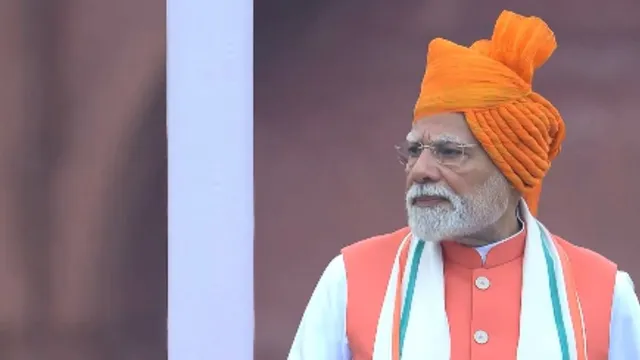- By Supratik Das
- Fri, 15 Aug 2025 08:02 AM (IST)
- Source:JND
Independence Day 2025: Prime Minister Narendra Modi, addressing the nation from the historic Red Fort on India’s 79th Independence Day, issued a stern warning to Pakistan over continued cross-border terrorism and nuclear posturing. Referring to Islamabad’s recent rhetoric on water sharing under the Indus Waters Treaty (IWT), PM Modi declared, “Khun aur pani ek saath nahi bahega” (blood and water cannot flow together), making it clear that India will not tolerate provocations.
The statement comes after New Delhi, in the wake of the April Pahalgam terror attack that killed 26 people, placed the IWT in abeyance until Pakistan credibly and irrevocably abandons support for cross-border militancy.
#WATCH | PM Narendra Modi says, "....Entire India was outraged, and the entire world was shocked by such a massacre (Pahalgam)...Operation Sindoor is the expression of that outrage....Destruction in Pakistan is so massive that new revelations are being made every day and new… pic.twitter.com/UJyLAHyOOH
— ANI (@ANI) August 15, 2025
Pakistan’s Reaction: Shehbaz Sharif Warns Of ‘Decisive Response’
Pakistan Prime Minister Shehbaz Sharif on Tuesday claimed that any attempt by India to stop the flow of water into Pakistan would violate the IWT and be met with a “decisive response”. Speaking at an event in Islamabad, Sharif said: “Enemy can’t snatch even a single drop of water from Pakistan. You threatened to stop our water. If you attempt such a move, Pakistan will teach you a lesson you will never forget.” He added that water was Pakistan’s lifeline and stressed there would be no compromise on rights guaranteed under international treaties.
Earlier this month, Pakistan’s Chief of Army Staff, General Asim Munir, raised concerns with a speech in Tampa, Florida, warning of nuclear retaliation against India. “We are a nuclear nation. If we think we are going down, we’ll take half the world down with us,” he said, adding that Pakistan would destroy any dam India builds on the Indus with “10 missiles”. He further asserted, “The Indus River is not Indians’ family property… we have no shortage of missiles, Alhamdulillah.”
Pakistan Peoples Party Chairman Bilawal Bhutto-Zardari escalated tensions after a blatant warning, “The Indus is ours and will remain ours, either our water will flow through it, or their blood.” Speaking at a rally in Sindh’s Sukkur, he accused India of trying to “rob” Pakistan’s water and called for unity among all provinces to defend it. Bilawal also invoked the Indus Valley Civilisation, claiming that Mohenjo-daro in Pakistan’s Larkana was the “true custodian” of the heritage PM Modi often references.
What Is the Indus Waters Treaty?
Signed in 1960 after nine years of World Bank-brokered negotiations, the IWT allocates the Western Rivers (Indus, Jhelum, Chenab) to Pakistan and the Eastern Rivers (Ravi, Beas, Sutlej) to India, while allowing limited usage of each other’s waters. India receives 20% of the Indus system’s waters, Pakistan 80%. Praised internationally as a rare example of sustained cooperation despite wars and crises, the treaty has also faced criticism in India for being overly generous to Pakistan despite its continued sponsorship of terrorism.
Following the Pahalgam terrorist attack in April, which killed 26 people, India has, in exercise of its rights as a sovereign nation under international law, placed the Indus Waters Treaty (IWT) in abeyance until Pakistan credibly and irrevocably abjures its support for cross-border terrorism. From the Red Fort, PM Modi lauded the Armed Forces’ swift action and warned Islamabad, “Nuclear blackmail aur nahi saha jayega… agar dushman ne yeh koshish jaari rakhi toh humari sena uska tay karegi. Hum mu tod jawab denge.”

